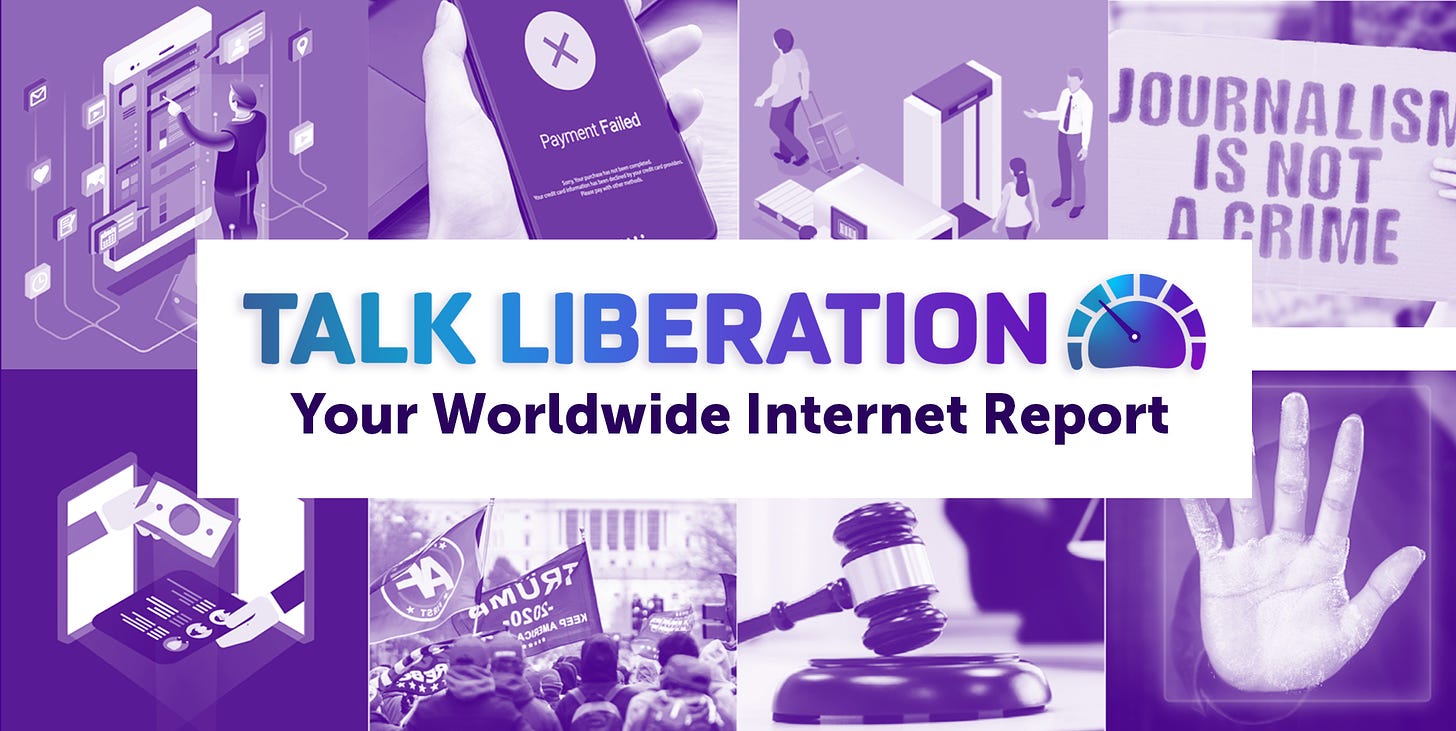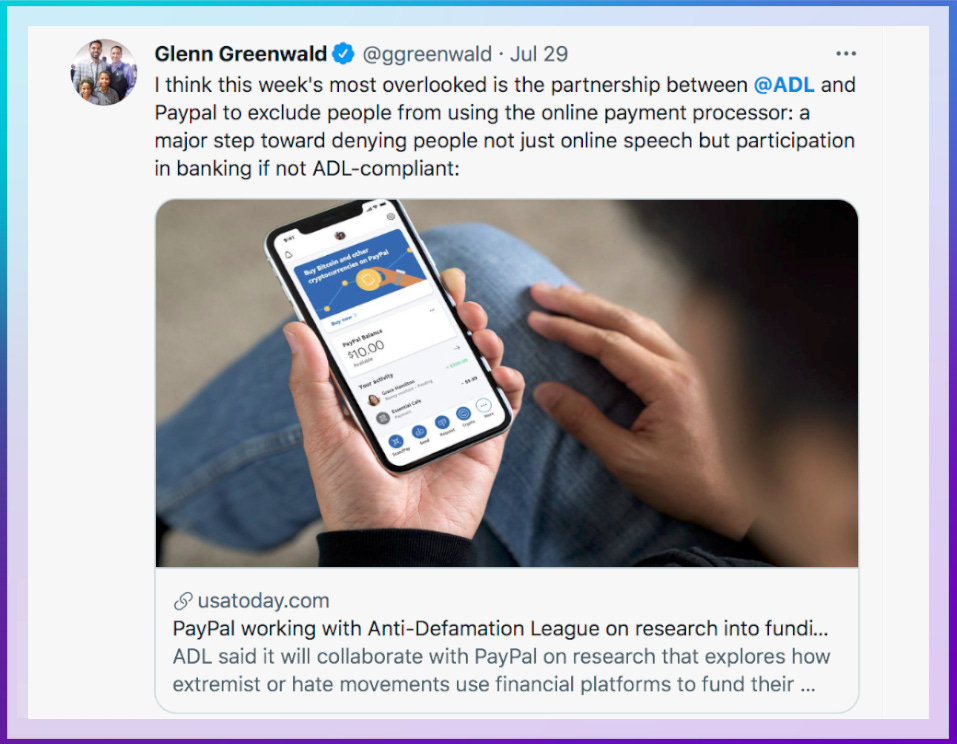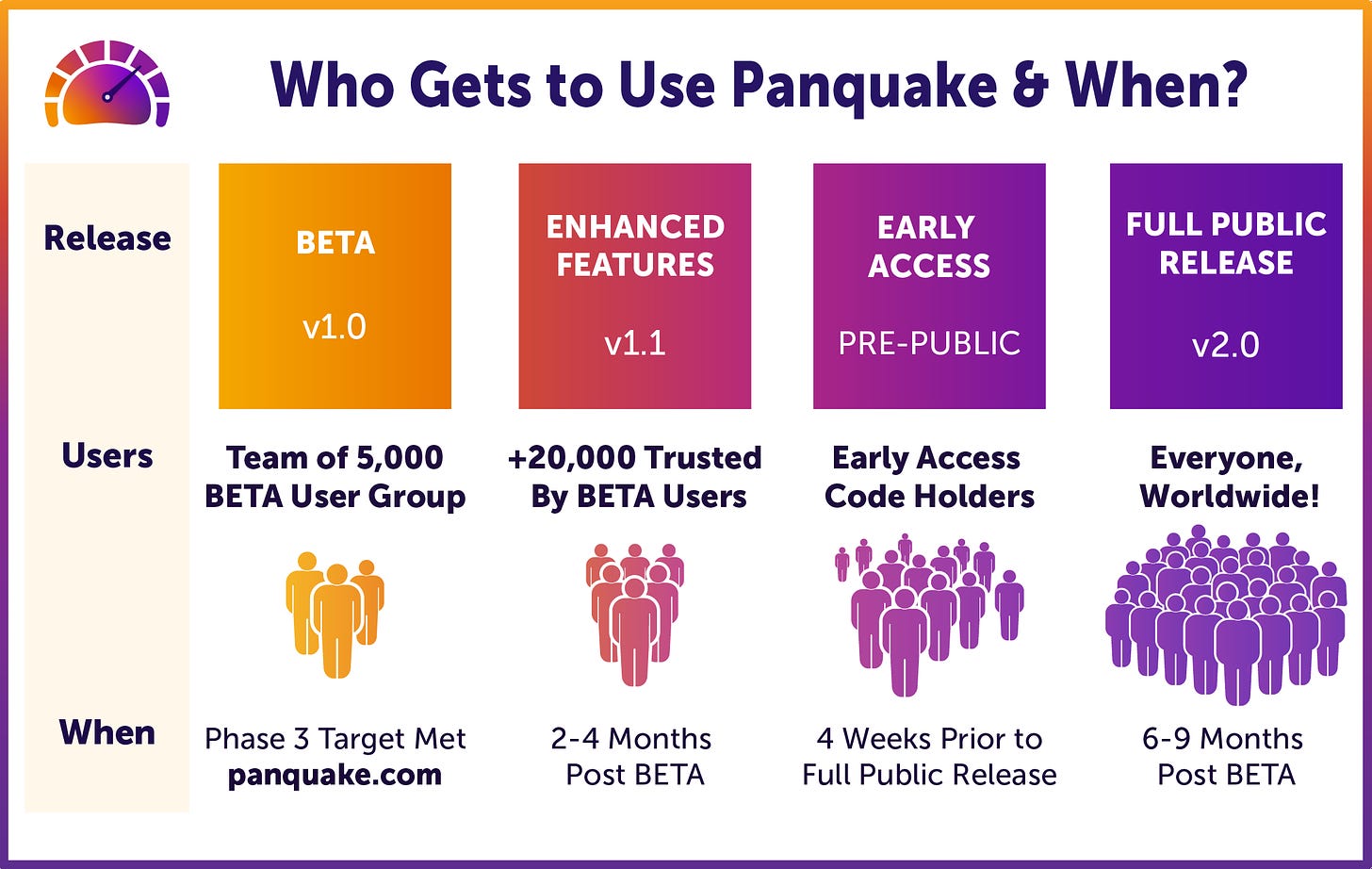Big Tech heavyweights continue their assaults on privacy as journalism is under attack. Talk Liberation - Your Worldwide INTERNET REPORT (Issue 4, 2021)
Julian Assange extradition case grinds on, Apple scans all customer photos, Amazon & PayPal intrude further into our lives and the UK threatens media freedom.

US government granted sweeping power in Julian Assange extradition case
Protestors carried signs that read "Free Assange, Free Speech" outside a UK courtroom this week in support of journalist and Wikileaks founder Julian Assange. Assange marked his past three birthdays in Belmarsh Prison, which has been called "the British Guantanamo," and has been under various forms of arbitrary detention for 11 years.
Talk Liberation is committed to providing equal access for individuals with disabilities. To view an accessible version of this article, click here.
A new ruling has made sure Assange's detention will continue, revoking an earlier decision and expanding the avenues that can be used by the US government to extradite him.
Earlier this year, in a move that was celebrated by journalists and human rights organizations, a UK judge decided not to permit his extradition. The judge's decision focused on Assange's mental health and the poor conditions of US prisons.
As Talk Liberation reported in July, a key witness for the US prosecution, Sigurdur “Siggi” Thordarson, admitted to lying to investigators in exchange for immunity. Thordarson fabricated various accusations against Assange that are central to the hacking allegations in the extradition case. This bombshell was met with a widespread media blackout, a silence condemned by media watchdogs.
Seven months after the UK judge's decision to block the US extradition request for Assange, the UK High Court agreed to hear a US appeal on limited grounds. In response, Amnesty International renewed its call on US authorities to drop the charges. Amnesty's Europe Director, Nils Muižnieks, said: "This attempt by the US government to get the court to reverse its decision not to allow Julian Assange’s extradition on the basis of new diplomatic assurances is a blatant legal sleight of hand."
Despite Assange's detention being condemned by leading international organizations, including the UN Office of the High Commissioner for Human Rights, the scope for US appeal has just been expanded to the maximum possible extent. The UK High Court has now granted the prosecution, acting on behalf of the US, permission to appeal on all of the grounds that they had requested.
This allows the US government's representatives to argue that errors were made in previous UK legal decisions which favored Assange, as well as question the relevance and severity of his mental health condition.
Apple makes every customer on the planet a suspect
Apple announced upcoming changes to its iMessage, iCloud, Search and Siri software that include what the company calls "expanded protections for children." These changes are planned to roll out later this year across all Apple operating systems and devices.
Apple intends to “warn children and their parents when receiving or sending sexually explicit photos” as well as “detect known [Child Sexual Abuse Material (CSAM)] images stored in iCloud Photos.”
NSA whistleblower Edward Snowden warned about Apple’s announcement, summarizing the feature as always-on surveillance. Snowden tweeted, “Apple says to ‘protect children,’ they’re updating every iPhone to continuously compare your photos and cloud storage against a secret blacklist. If it finds a hit, they call the cops. iOS will also tell your parents if you view a nude in iMessage.”
This echoed statements from advocacy groups such as the Electronic Frontier Foundation (EFF) that emphasized Apple’s new technology as a backdoor. “Apple is planning to build a backdoor into its data storage system and its messaging system,” the EFF wrote in a blog post, “Apple can explain at length how its technical implementation will preserve privacy and security in its proposed backdoor, but at the end of the day, even a thoroughly documented, carefully thought-out, and narrowly-scoped backdoor is still a backdoor.”
Concerns center around the likelihood of broad abuse. Apple’s systems may be designed to protect children but are reminiscent of warrantless surveillance by spy agencies and their contractors. Apple’s announcement comes just weeks after shocking disclosures about NSO group and its Pegasus spyware that targets journalists and can exploit all recent iOS versions.
The capability for Apple’s technology to be used for malicious purposes has not gone unnoticed by civil liberties organizations. Jennifer Granick, surveillance and cybersecurity counsel for the ACLU’s Speech, Privacy, and Technology Project, told Gizmodo, “The CSAM scanning capability could be repurposed for censorship or for identification and reporting of content that is not illegal depending on what hashes the company decides to, or is forced to, include in the matching database. For this and other reasons, it is also susceptible to abuse by autocrats abroad, by overzealous government officials at home, or even by the company itself.”
PayPal to monitor extremism
PayPal is teaming up with the Anti-Defamation League (ADL) to research how extremist groups and terrorist organizations use platforms to fund their activities, USA Today reports. This partnership comes at a time when PayPal has dropped various independent news organizations from its platform. PayPal and ADL will share their results with law enforcement, the financial sector and policymakers. The new initiative will be run through ADL’s Center on Extremism.
Additionally, both organizations will unite with disadvantaged and marginalized communities to protect them from extremism. ADL CEO Jonathan Greenblatt said in a statement that this is a unique opportunity to better understand how hate and extremism spreads, Reuters reports.
The reaction on Twitter was quite negative. Award-winning journalist Glenn Greenwald tweeted that this was “a major step toward denying people not just online speech but participation in banking if not ADL-compliant.”
Electronic Intifada, an organization dedicated to raising awareness for Palestinian rights stated in a tweet “As a group hostile to advocacy for Palestinian rights and other progressive causes, the ADL ‘should not be the arbiter of what is ‘hateful’ or ‘extremist’ for a private corporation.”
UK continues to criminalize journalism
The UK’s Official Secrets Act may expand to criminalize investigative journalism domestically and abroad. The Home Office argues the OSA should be revised to include modern counter security threats, the BBC reports.
The Home Office, the UK government ministry overseeing internal security and law led by the Home Secretary Priti Patel, produced a ‘consultation’ document—which usually precedes the tabling of new legislation—that makes the leaking by current or former civil servants of information considered ‘damaging’, a criminal offense. Additionally, over the past decade there has been a string of high profile whistleblowing cases. The rules are even stricter for secret service staff, for whom disclosure of any kind is automatically a criminal offense. Publishing such leaked information, called ‘onward disclosure,’ would then also designate journalistic activity criminal and potentially result in jail-time for journalists.
The Official Secrets Act was passed in 1911 and most recently revised in 1989. The new proposal argues for increased maximum sentences and a broader coverage of information. The Home Office argues that the greater controls over information and journalism are needed due to 'new security threats’ in the modern era. Furthermore, it argues that journalists should not be able to present a public interest defense. This has sparked anger from campaigners to journalists. Reporters Without Borders said a public interest defense was a “crucially necessary reform” to prevent “serious risks for journalists.”
The Sun newspaper speaks of a “license for cover-up” and a “chilling clamp” on investigative journalism. Alan Rusbridger, a former Guardian editor, spoke of a “menacing threat to free speech” and the criminalization of journalism.
Meanwhile the government claims that journalists are rarely prosecuted under the Act.
Amazon amps up biometric technology
Amazon is offering $10 in exchange for your palm print to enhance its biometric palm print scanner, called Amazon One. Agreeing to get your palm print scanned by Amazon and linked to your account can earn you $10 in credit. This biometric scanning technology means you can pay by waving your hand over a scanner – a practice introduced in an increasing number of Amazon stores since February 2020.
Like a fingerprint, the palm print is unique to each individual and hence can identify people easily, yet Amazon says it will store the information indefinitely.
In an email to Talk Liberation, Albert Fox Cahn, Executive Director of the Surveillance Technology Oversight Project (S.T.O.P.), warned:
“I can’t put a price on selling my body, but Amazon did, and it’s shockingly low. Biometric tracking that’s both inescapable and life-long. When we give away our palm prints, we’re not just enabling the surveillance Amazon has planned today, but the ways they might want to track us decades from now.”
Zoom settles multi-million dollar lawsuit
The video conferencing app Zoom settled an $85 million lawsuit for privacy violations. The lawsuit claims Zoom stored and sold user data to Facebook, LinkedIn and Google. Additionally, Zoom allowed hackers to interfere in meetings in what is referred to as “Zoombombing,” according to CNBC.
Plaintiffs in the class action lawsuit may be eligible for a 15% refund on their subscription or may receive $25 while others may receive $15. US District Judge Lucy Koh, who is hearing the case, will have to approve the preliminary settlement, which comes after Judge Koh ruled that the plaintiffs may issue some contract-based claims.
Zoom meeting subscriptions have earned the video conferencing platform $1.3 billion from class members. The plaintiffs intend on seeking more than $21 million for legal fees.
During the Covid-19 lockdowns and restrictions, Zoom’s user base has increased significantly. This year Zoom has 497,000 customers whereas in January 2020 the company had 81,900 customers.
Amazon hit with large fine for privacy violations
Amazon is facing a record $886.6 million European Union fine for gathering and storing personal data violating the EU’s General Data Protection Regulation (GDPR), Reuters reports. The EU’s GDPR requires companies to ask permission before processing one’s personal data. The mega corporation revealed that the Luxembourg Commission for Data Protection (CNPD) issued the fine on July 16 as Amazon’s European headquarters is located in Luxembourg.
Amazon claimed in the filing that it considers the case to be without merit. According to Reuters, a company spokesperson says that Amazon will appeal the fine. CNPD argues that Amazon did not comply with the GDPR. Additionally, Amazon has been ordered to amend certain business practices, according to CNBC.
Google fires employees for abuse of data
Leaked documents show Google fired more than 60 employees between 2018 and 2020 for security and data misuse, Vice Motherboard reports. The internal documents, obtained by Motherboard, provide information on how the employees use their position within the company to abuse data they have access to.
Such activity is not limited to Google, Motherboard previously uncovered the theft, leaking or abuse of data at Facebook, Snapchat and MySpace, whereby staff would use their access to stalk or spy on users.
“We are transparent in publicizing the number and outcome of our investigations to our employees and have strict processes in place to secure customer and user data from any internal or external threats,” Google stated.
The document says that 86% of all security-related allegations against employees included the mishandling of confidential information, including the transfer of internal-only data to outsiders.
TSA PreCheck to monetize passenger data
The expansion of Transportation Security Administration (TSA) PreCheck could allow for companies to link the program’s benefits to ads in order to monetize passenger data, according to Axios.
TSA PreCheck status lets travelers pass through airport security faster with their shoes on and electronic devices stored away. However, new changes to this program could pass customer information to for-profit enterprises looking to monetize passengers’ data.
The TSA has employed the companies Idemia, Telos Identity Management Solutions and Alclear, a subsidiary of Clear Secure, to collect the applications, while the screening is done by the TSA. Clear Secure runs biometric screening kiosks at 38 airports and 26 sports venues and now seeks profit opportunities. However, Justin Oberman, a Chicago consultant and former TSA staff, warned that “they are building a cake, layer by layer by layer… It would be like if there were ads for tax prep software on the IRS home page. It’s just a bridge too far.”
Capitol Hill investigation controversy
A man accused of participating in the January 6th Capitol Hill riot was ordered by a federal judge to open his laptop “with his face.” Prosecutors argued that the laptop contains video footage that would incriminate the suspect in an “attempted insurrection.”
Guy Reffitt was arrested in late January and his laptop had been seized. It was password-protected but can be unlocked using Reffitt’s face. When the suspect argued that he could not remember his password, the court ordered his biometrics to be used to unlock the laptop.
The Fifth Amendment grants anyone the right to remain silent, including to the question of what the password of a laptop is. However, using biometric information to unlock a laptop circumvents this constitutional protection.
Panquake update: Public delivery meeting no. 6
Panquake CPO Suzie Dawson announced that the blockchain-based social media application is inviting supporters to apply to participate in the project’s BETA release. At a public event, Dawson detailed company plans for four future iterations of the Panquake application, starting with the 1.0 beta application version. The users will be part of what Panquake is calling the “Team of 5000,” which is the beta user group.
A crowdfunding campaign for the application is running strong, with over 3,000 small donors totaling over $135,000 in donations providing sustenance for the BETA build to date. The beta release will come out once a phase 3 fundraising target of $500,000 has been reached.
In a second iteration scheduled for between two and four months post-BETA, the Team of 5000 will be able to invite up to four trusted friends, colleagues or acquaintances to the beta platform, boosting the user number to up to 25,000 users on Panquake. Users can apply here to be one of the trusted Team of 5000.
The next Panquake public delivery meeting will be held on August 28, 2021 where Panquake CPO Suzie Dawson will provide an update on the application’s progress for the month of August.
That concludes Your Worldwide INTERNET REPORT for this week!
Remember to SUBSCRIBE and spread the word about this amazing news service.
This issue of Your Worldwide INTERNET REPORT was written by Taylor Hudak; Edited by Suzie Dawson and Sean O’Brien; Graphics by Kimber Maddox; with production support by David Sutton.
Talk Liberation - Your Worldwide INTERNET REPORT was brought to you by panquake.com. We Don’t Hope, We Build!
© Talk Liberation CIC Limited. The original content of this article is licensed under a Creative Commons Attribution-ShareAlike 4.0 International license. Please attribute copies of this work to “Talk Liberation” or talkliberation.com. Some of the work(s) that this program incorporates may be separately licensed. For further information or additional permissions, contact licensing@talkliberation.com

